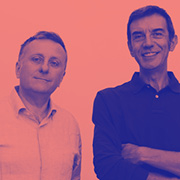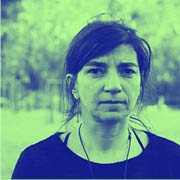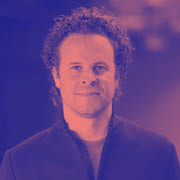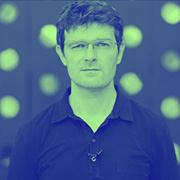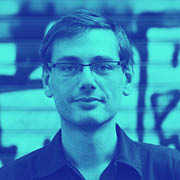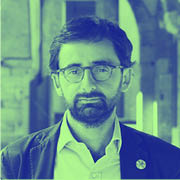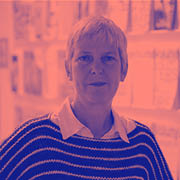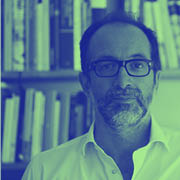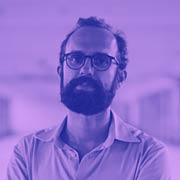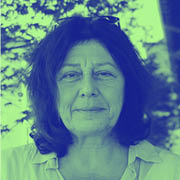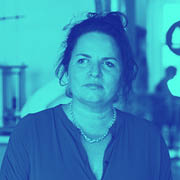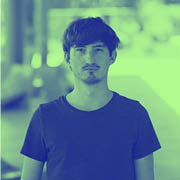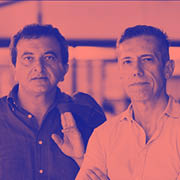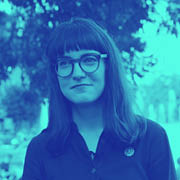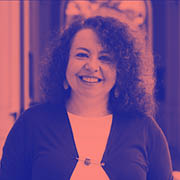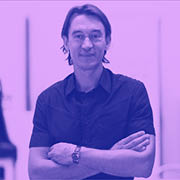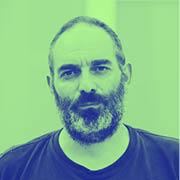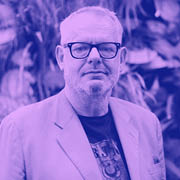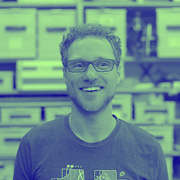ARCHITECTURE HISTORIAN, CRITIC & CURATOR
LUCA MOLINARI
Luca Molinari is Associate Professor of Contemporary Architecture History at Vanvitelli Architecture Faculty in Naples. Molinari is based in Milan, where he works as a critic and curator. His office engages with curatorship, exhibitions, cultural events and also works as a consultant on an individual basis on international design competitions for specific clients.
TERMS
bodyspace
entrepreneurial awareness
changing borders
social contract
NEW ECOLOGIES
BODYSPACE
I use the term bodyspace since my perception is that, in the last years, both designers and industries are increasingly investing in the relationship between body and what I call ‘narrow space’ – the surrounding space intrinsically associated with the body. We are living in a hyper-dense, metropolitan environment and the sense of the space we are creating around us is getting more and more interesting. I was very surprised by a recent study by The Why Factory led by Winy Maas. They were working with different industries on the way we could bring space with us and use it in completely different ways. The study looks at building our own houses and our own environments by transforming the space around us via hypersensitive materials. The house is a structure that changes continuously and we are moving from the permanent built form to something, which lives with us - almost like a dress - that becomes our house. I think this is just the beginning, but it is a very interesting beginning as it gives a completely different sense of awareness and consciousness of our bodies in space. It questions how we can model it, how we can interact with other bodies in other spaces, how spaces can be shared and used differently, and how materials can react to changing space. It sounds like science fiction, but it points to arguments which are very relevant to today’s issues of land consumption, sustainability, the way we use resources and our awareness of the environment - it feeds into important issues to consider in the coming years.
URBAN ASSETS
ENTREPRENEURIAL
AWARENESS
This term is very much related to what I do as a consultant. We design international competitions where we are used to working with economists, financial advisors and entrepreneurs. I consider it important that the word entrepreneur and the idea of awareness go together. To talk about an aware entrepreneur may appear quite banal, but after the 20th century, when entrepreneurship became associated with consumption fuelled by the idea of endless use of materials, energy, soil and resources, it becomes important again. Today, the idea of awareness in the economy is crucial because this means that, as an entrepreneur, you must be conscious of the economic feedback and financial feedback of your investment, but also of the wider consequences of what you are doing. Understanding that what you are doing is not only a simple financial investment, but one that bears social, economic and ecological consequences as well. The terms very much relate to the emerging figure of a new entrepreneur who increasingly considers their social responsibilities. This is something I wish was more evident presently; through the financial crashes we are now experiencing the end of the twentieth 20th century economy. New entrepreneurs all over the world are investing their money differently - not without losing the idea that you must gain money with investment but the fact you have a greater responsibility beyond the financial. A central issue of the next century is to make entrepreneurs aware, of the consequences of their actions, the fact that they can do things differently, and the fact that these processes can transform the space around us, and have a significant social and political impact. The idea of awareness for me is a central, cultural tool for the next decades of financial assets. This is very important because it’s also the way we will formally educate entrepreneurs. We are living in the post-capitalist era, – a kind of ultra-liberalism, and I don’t think we will escape from this concept. So we will reconsider the meaning of words like money, investment, and finance, through this perspective of reinterpreting the typical neoliberal concept of economy.
DIGITAL TOOLKIT
CHANGING
BORDERS
Changing borders reflects how the digital environment is influencing and becoming embedded within every fragment of our lives. The traditional distinctions between private and public, in and out, open and closed. All these typical concepts which have shaped the forms of our cities and our houses, are transforming under the pressures of the new ways in which we live. These changes are related to the fact that every morning we wake-up and the first thing we do is look at our smart phones and suddenly we access many layers of public and private information whilst allowing that same information to enter into our public privacy. This ambiguity gives the idea of borders a whole different dimension. Now we are living on the fields of a deeply radical transformation, where borders are being reassessed in completely different ways. I believe they will become sliding borders we cross continuously with different understandings of what they mean. One of the first victims of this process is the traditional idea of privacy. Privacy is a word, which is crumbling under the weight of these developments. Privacy is now a fake word. The idea of 19th century middle class: ‘I close the door of my house and the city disappears’ is no longer realistic - we are living in a completely different world. The death of the word of privacy, in its traditional sense also undermines the old model of living in the city - privately. It means reconsidering the ideas behind designing housing typologies for example - something incredibly interesting. The consequences suggest that finally, after 200 years, people are breaking down the walls of privacy, and we are beginning to live differently.
NEW COLLECTIVES
SOCIAL
CONTRACT
The term social contract - which comes from Rousseau’s ‘Du contrat social’ - is the idea that every community has to sign a formal contract in order to define citizenship, and through citizenship, create space to live together. This is a typical Enlightenment perspective, but I think it is still very interesting today, because what we are experiencing is the extreme fragility of traditional public and political institutions in response to strong pressure from bottom-up structures reclaiming power. However, as the extreme forms of populism we are experiencing today reveal, there is a worst-case scenario to this shift. From Holland, to Italy, to Donald Trump in the US, we are glimpsing the dark side of ‘getting back the power’. Illustrating the danger that people might not recognize the legitimacy of the traditional institution, the structure which is able to govern the daily life of society. This is very delicate, and very frightening from certain points of view, however I think it is a consequence of the deep metamorphosis we are experiencing in contemporary society. What we call crisis is part of a wider shedding of our skin, fundamentally changing some parts of societal body or structure. Considering a new social contract means considering this metamorphosis that is taking place every day, on different layers, across times, groups and networks. People are changing, acting like contemporary tribes with new forms of contract, which are far more fluid than before. I think the social role of the architect, through this changing situation, could be very important - and could be one of the ways to redefine the idea of architecture today.
INTERVIEWED BY
GIANPIERO VENTURINI
Luca Molinari has always been obsessed with the use and meaning of words. We examine this obsession through examples from his rich career.
website
lucamolinari.it
GV:
Is there a term that connects the ones you just mentioned?
LM:
Consciousness is this connecting term. Consciousness is the way we connect the changing role of architecture, the presence of economies in transforming our environments, how communities work and the way we use our bodies in space. Consciousness means being aware of what you are looking for - what the political and cultural tools are through which we frame the reality around us and allow us to understand how we can influence our environments, This will allow communities to operate differently in our environments. In endless digital environments, where apparently we can have everything, the idea of being conscious is even more important. The fact that near limitless information is available to us at every moment does not make us omniscient. We must strongly question what we are looking for so the idea of consciousness is central at every level, across architecture, decision making processes, investment, citizenship - everything.
GV:
This project is about creating a New Vocabulary of Terms, what do you think defines contemporary vocabulary and is there something that should change about it?
LM:
I think the idea of a new vocabulary is a great question. For me it is a kind of personal, obsession. For many years, I have been writing and lecturing about the idea that the words we are using are increasingly unrepresentative of the phenomena we are experiencing when we talk about the city. I am talking about these basic keywords. In the last fifteen years, I’ve seen many publications attempt to create a new vocabulary. It was a kind of Neologism, which I see as a typically schizophrenic avant-garde, 20th century approach. For me this is not the way. While we do need to redefine words and neologisms are a continuous part of our lives, I think that it is more politically relevant to work on the basic words we are using on a daily basis. To redefine our understanding of words such as house, square, city, countryside and nature, will be far more politically influential than changing the words altogether. People, normal people, seven and a half billion of them, are using these words everyday, not neologisms, which we can find in beautiful, widely circulated publications that we used to buy. It is more politically influential to redefine them because it is more effective - more radical. This comes back to one of the terms – awareness - because if people understand the word they are using, through a process of simple redefinition, it will allow them to have more cultural and political tools to change the world around them. I think that we, as those involved in the design process, as well as cultural and political processes, should primarily work with the words people are using every day.
To redefine our understanding of words such as house, square, city, countryside and nature, will be far more politically influential than changing the words altogether.
GV:
Do you recall any positive or negative experiences you had with vocabulary in communication between disciplines - a moment when a word from a different discipline inspired you or when you discovered you were misunderstood because of a lack of common understanding of terms used by specific disciplines?
competition
'S. PELLEGRINO FLAGSHIP FACTORY'
Designed by Luca Molinari
lucamolinari.it
LM:
As a curator, when I realise an architectural exhibition, I am addressing an audience which is more aware of what they are looking at. In the other aspect of my work however, which is designing competitions I work with key investors and clients looking for architectural outcomes. In these situations it is very interesting to find ambiguities in the use of terms, because across economics, law, or music, the use of architectural or spatial words occur in completely different ways. For example, we recently designed a large competition for San Pellegrino in the north of Italy. The first month we had a technical meeting with the people of the factory called the ‘master plan group’. For us it was simple: ‘Fantastic! They are working on the master plan!’ For them however, the masterplan was completely different – it related to the flow of trucks, the flows of economy and the positioning of people. It was very interesting, because we had to change the word ‘master plan’ as it was so strong in the organisation that it was impossible for them to understand our architectural perspective. We decided to use simpler words like the competition title The New Factory and the masterplan retained their understanding as the management of data and complexity.
exhibition
'NOI. Storia di comunità, idee, prodotti e terre reggiane'
Curated by Luca Molinari
Musei Civici di Reggio Emilia
16.05.2015 – 30.04.2016
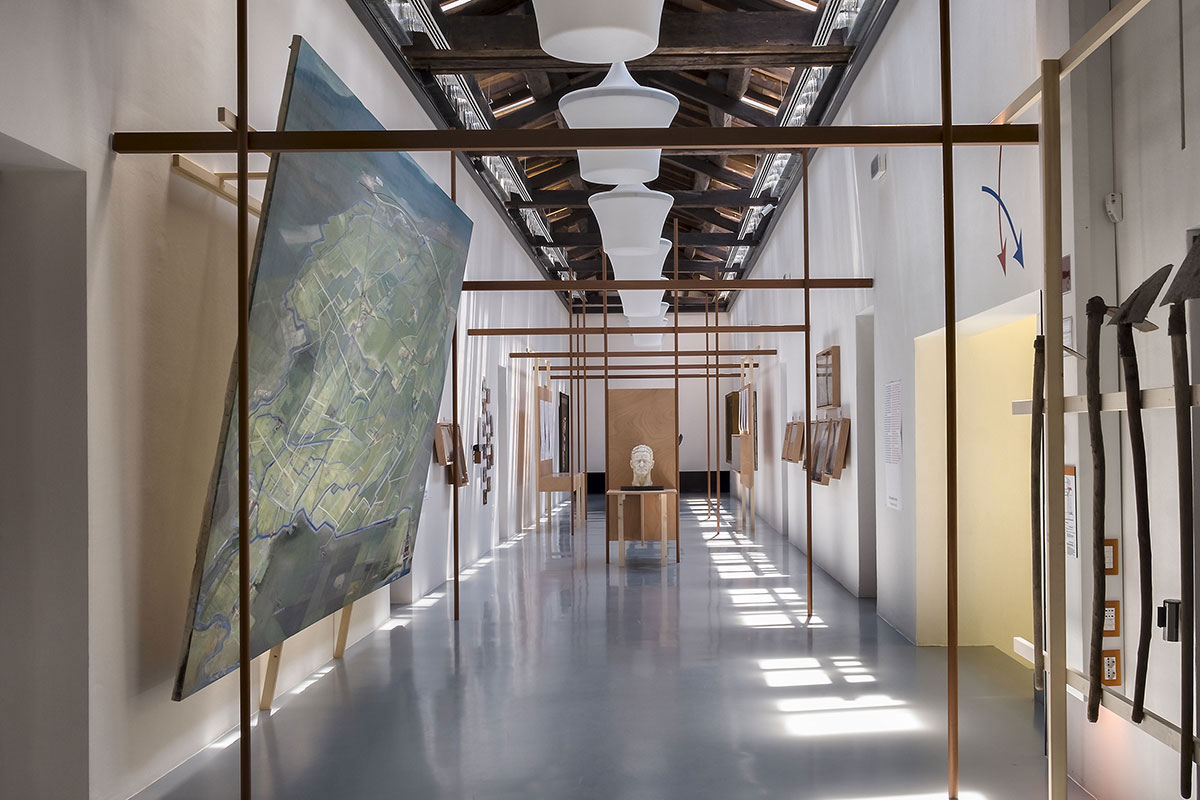

GV:
You are an architectural critic, curator, writer and theorist. Have you ever found yourself in a situation, which required you to invent or define a new term in order to describe a specific concept?
LM:
Our goal with the work I am doing with my team is to always seek to redefine traditional words. I think you need to develop curiosity towards the storytelling behind the term. Two years ago, we did an exhibition about Reggio-Emilia and its context. It was very typical, the municipality came to us and said: “we want to do a big show about our city, because we are connected with the EXPO and the high speed train will bring a lot of people. We want to do an exhibition to present ourselves.” The title of the exhibition became ‘noi’ (us), which was an interpretation of the area’s context based on the fact that Reggio-Emilia was founded in cooperation. Instead of talking about Parmigiano Reggiano, Grana Padano, Lambrusco, or Calatrava - we decided to fix the root connection - to make it universal. I think that today, one of the most interesting ways of working with words, is to play on the universality. These words can enter in the daily narrative of people and can be immediately understood. To play with basic words, which can become universal for everybody is, for me, the most tricky and fundamental rhetorical and political tool we can use.
